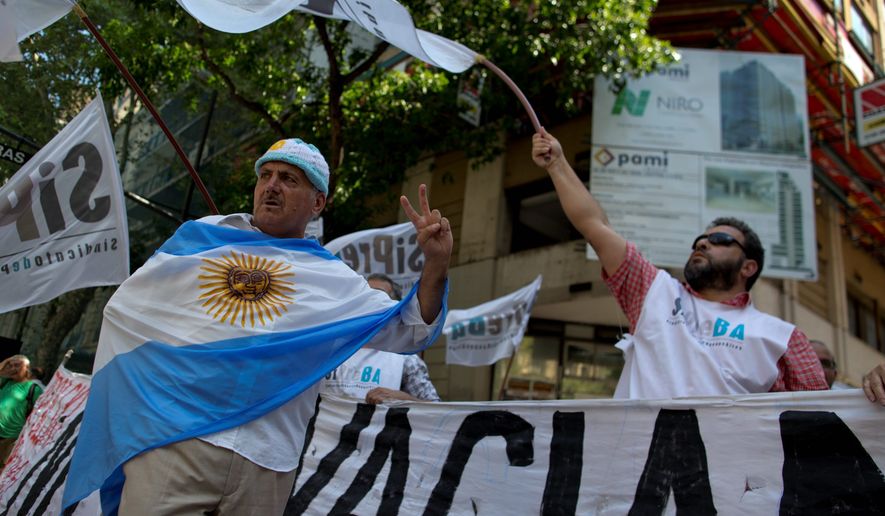BUENOS AIRES — For the first time since he took office in December, center-right President Mauricio Macri faced a challenge from organized labor on Wednesday as a public-sector union with close ties to his populist predecessor staged a nationwide strike over job cuts, but the challenge proved a weak echo of previous protests.
The Government Workers Association managed to fill Buenos Aires’ iconic Plaza de Mayo and slow traffic in the city’s main arteries, but the size of the demonstration paled in comparison to two general strikes held in 2015, the final year of former President Cristina Fernandez’s eight-year presidency.
The message emanating from the square Wednesday was a far cry from the massive Dec. 9 farewell rally also held there, when the outgoing Ms. Fernandez had reiterated her refusal to attend Mr. Macri’s inauguration, a break with protocol then viewed as the opening salvo of a campaign to undermine her successor and preserve her own claim to power.
With leftist governments across South America struggling, many are watching Argentina’s political transition with particular interest. Mr. Macri is trying to set a new course for the country that followed a leftist, populist agenda under Ms. Fernandez and her late husband and predecessor Nestor Kirchner since 2003.
Local commentators focused more on the failure by protesters Wednesday to garner support from Argentina’s major labor federations. The lack of belligerence among unionists traditionally aligned with Peronism suggests that Ms. Fernandez is no longer in control of her own forces, said Facundo Cruz, a political scientist at the University of Buenos Aires.
“There is a lack of coordination,” Mr. Cruz said. “It’s not a federation of unions that is calling for the strike; it is a single union. And if the transportation [sector] doesn’t strike, you don’t feel it.”
SEE ALSO: MH17: Report claims Russian soldiers downed plane in Ukraine
The public-sector union took to the streets to demand Mr. Macri drop planned spending cuts and hire back thousands of government workers who have been fired. Mr. Macri has accused his predecessor of overhiring for the sake of political patronage.
Most union bosses, meanwhile, have little appetite be part of an “irrational opposition” and confront Mr. Macri during the “honeymoon” phase of his presidency, said Joaquin Morales Sola, a prominent political commentator for the La Nacion daily.
“They don’t want to play Cristina’s game,” he said, “which is an intransigent opposition to Macri.”
Meanwhile, Ms. Fernandez’s clout seems to be vanishing not just in the streets: In the House of Deputies, 13 out of 94 lawmakers of her Front for Victory deserted ahead of the first session in March, making Mr. Macri’s Cambiemos coalition the largest bloc in the lower chamber of the Argentine Congress.
Aside from Alicia Kirchner, Ms. Fernandez’s sister-in-law and the recently elected head of the southern province of Santa Cruz, the former president now also lacks allies in any of the nation’s governor’s mansions, many of whose tenants are jockeying to take the helm of Peronism.
In another boost for Mr. Macri, a former businessman who has moved to loosen state controls on the economy, the White House announced last week that President Obama in March will become the first U.S. president to visit Argentina since President Bill Clinton came to Buenos Aires in October 1997.
SEE ALSO: China deploys fighter jets to contested South China Sea island
Mr. Obama plans to discuss “President Macri’s reform agenda and recognize his contributions to the defense of human rights in the region,” the White House said in a statement. “The president will deepen efforts to increase cooperation between our governments in a range of areas, including trade and investment, renewable energy and climate change, and citizen security.”
Along with his domestic reforms, Mr. Macri was determined to shed his predecessor’s shadow to mend ties with Washington and signal to American companies that Argentina was open for business, Mr. Morales Sola said.
“The key notion of the president’s policy is to re-establish an excellent relationship with the United States,” he said. “Everything else comes second.”




Please read our comment policy before commenting.